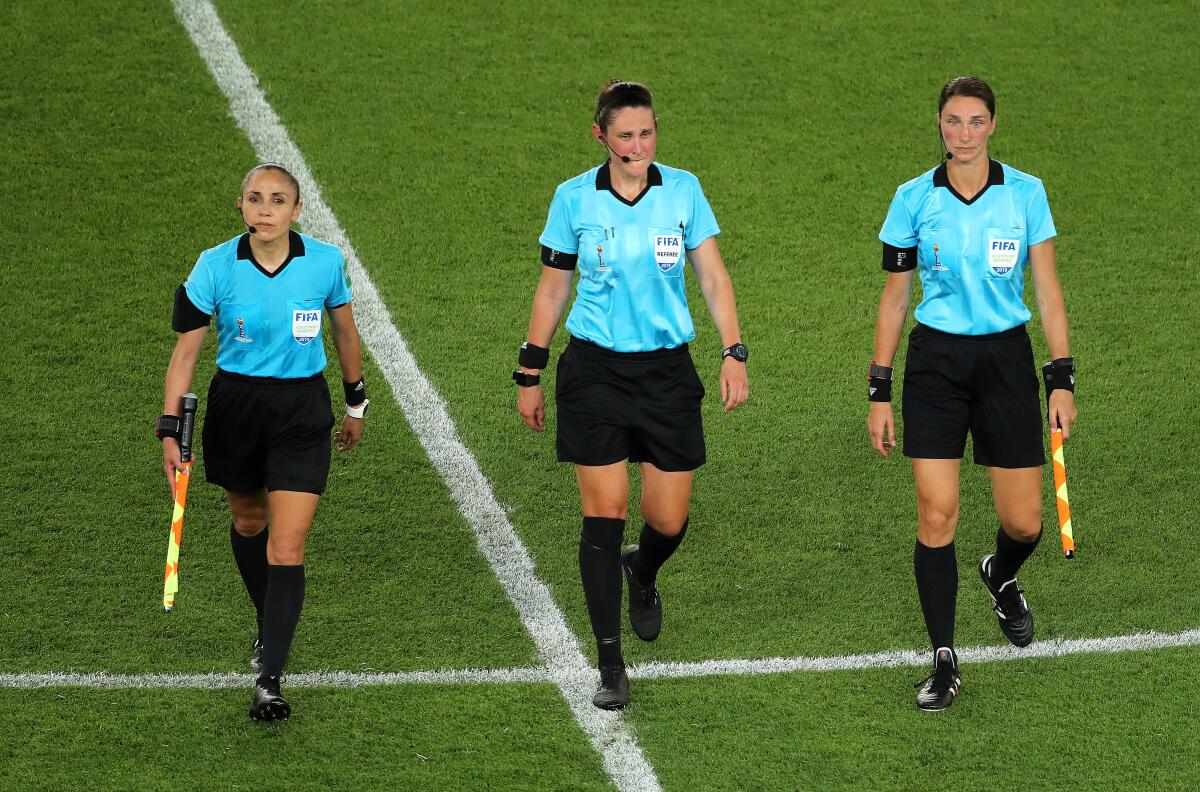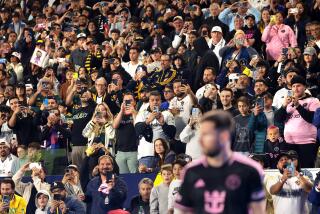Chula Vista teacher among 47 MLS referees who also will experience ‘bubble life’

In her 11 years as a professional soccer referee, Felisha Mariscal has worked World Cup games, MLS playoffs and Olympic qualifiers. She hass worked in blistering heat and driving rain, in empty stadiums and before packed houses.
But she has never done a game while sequestered in a hotel during a global pandemic. That will change next week when Mariscal works an opening-round match of the 54-game MLS Is Back tournament at ESPN’s sprawling Wide World of Sports complex in Orlando, Fla.
The Chula Vista teacher is one of 47 referees chosen to officiate the competition, which begins July 8. And like the players and staff from the 26 Major League Soccer teams, the referees will spend the entire tournament inside the league’s protective bubble at Disney’s Swan and Dolphin resort in an effort to keep the deadly coronavirus at bay.
“This quarantine will be more difficult since there will not really be a chance to get out of the daily routine; to be able to go to a mall or a movie theater,” Mariscal said.
Galaxy player Efraín Álvarez was a child prodigy. Now facing a turning-point season, he used the coronavirus shutdown to improve his lifestyle with healthier eating and a new workout program.
That isolation could be more pressing for the officials because unlike the players, who can lean on their teammates and coaches for support, referees are more like independent contractors who rarely work in the same six-person teams.
“These are unusual times and this is an unusual environment for our officials,” said Howard Webb, the former World Cup referee who is now general manager of the Professional Referees Organization, which manages soccer officiating in the U.S. and Canada. “I’m hopeful that most of them are going in with their eyes fully open.”
The officials are being housed apart from players and in their own wing of the hotel, but they will be subject to the same anti-COVID-19 protocols, meaning frequent testing, social distancing and the use of facial coverings whenever they leave their rooms. They also will have their own gym and regularly scheduled workouts.
During the 39-game group stage, officials will be limited to no more than two groups, reducing the number of teams they will be exposed to in case of COVID infections. The best-performing officials will be asked to stay for the knockout rounds and the rest will be sent home.
To combat the boredom, Webb said his officials will have access to many of the same leisure activities as the players, such as golf and table tennis. The group also will gather to watch — and analyze — the games they aren’t working.
“It’s a controlled environment and that’s always a winner in my experience with referees,” Webb said. “But of course we’ll be looking to give our officials things to keep them entertained and occupied. And also hopefully build a team bond, which is going to be beneficial coming out of this.”
Boredom isn’t the only obstacle referees will be dealing with though. Some aren’t full-time referees, meaning they had to leave jobs as well as family for up to seven weeks to be in Orlando. And many have never worked a game in an empty stadium. The MLS tournament will be played without fans.
To prep officials for the latter circumstance, Webb arranged chats with officials from Europe, where games resumed behind closed doors in May.
After selling his Calabasas compound with a soccer field last year, Jermaine Jones has picked up a Malibu retreat for $1.895 million.
“Refereeing in a normal way for what hopefully will be a normal game,” were Webb’s instructions. But, he added, it is an “unusual experience, being able to hear all the comments of the players, be[ing] aware that the players can hear the communication between the officials. When two players come together physically, the sound is going to be different.
“Don’t overreact to those types of things, I think that was important.”
Mariscal, 37, checked into the hotel last week along with her twin brothers, Apolinar and Eduardo, who are also MLS referees. Yet even with her siblings present, Mariscal, whose son will turn 4 this month, said missing family will be toughest part of the assignment.
“I know the feeling of being away from home for a month or more for a soccer tournament. I know what to expect and I know what the difficult things are that will come up,” said Mariscal, who hasn’t worked a match in nearly four months. “In last year’s World Cup in France my family was able to go. In Orlando, due to COVID-19, that is definitely not an option.
“There will definitely be a lot of video calls with my family.”







